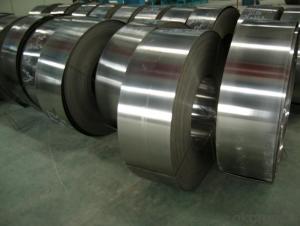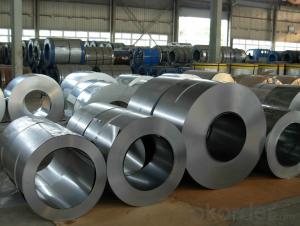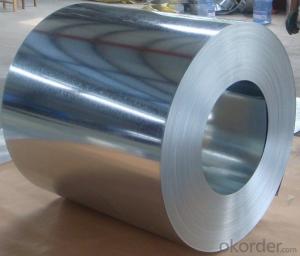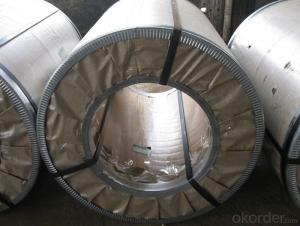Cold Rolled Steel Coil with Prime Quality various sizes and Lowest price
- Loading Port:
- Shanghai
- Payment Terms:
- TT OR LC
- Min Order Qty:
- 100 m.t.
- Supply Capability:
- 10000 m.t./month
OKorder Service Pledge
OKorder Financial Service
You Might Also Like
1.Structure of Cold Rolled Steel Description:
The raw material of cold rolled steel coil/sheet is high quality hot rolled product, and after pickling continuous rolling,.
Thickness: 0.16mm~1.5mm,0.16-1.5mm
Width: 1250,600-1250mm
Coil ID:508/610mm
5.FAQ of Cold Rolled Steel
We have organized several common questions for our clients,may help you sincerely:
1.How about your company?
A world class manufacturer & supplier of castings forging in carbon steel and alloy steel,
3. How long can we receive the product after purchase?
Usually within thirty working days after receiving buyer’
• High strength
• Good formability
• Good visual effect
3.Cold Rolled Steel Images
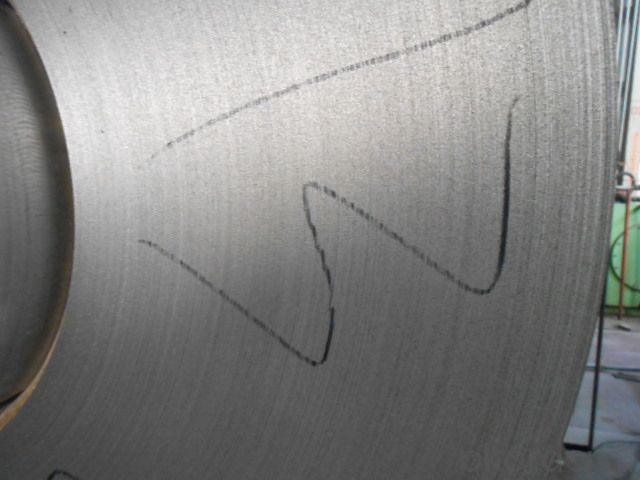
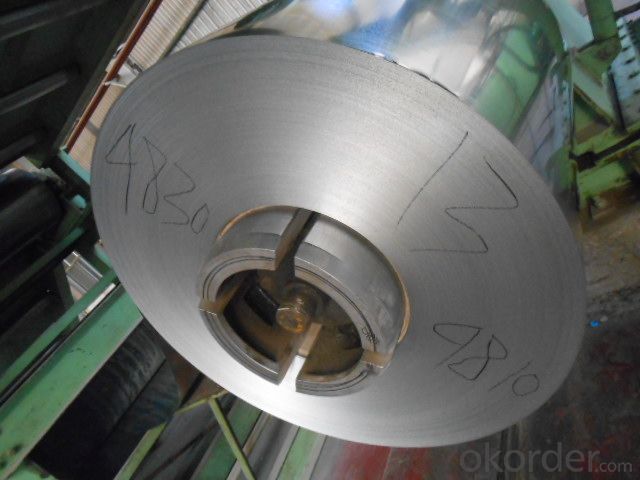
Usually within thirty working days after receiving buyer’
4.Cold Rolled Steel Specification
Standard:AISI,ASTM,DIN,GB,JIS,JIS G3302 ASTM 653M EN10142
Coil weight:3-12 MT Grade: Q195~Q345
2.Main Features of the Cold Rolled Steel:
• W
- Q:Can steel coils be coated with silicon?
- Yes, steel coils can be coated with silicon.
- Q:How are steel coils used in the manufacturing of suspension springs?
- Steel coils are used in the manufacturing of suspension springs by being tightly wound and then shaped into a helical or spiral form. These coils provide the necessary flexibility and strength required to absorb and distribute the weight and force exerted on the suspension system, allowing for a smooth and stable ride.
- Q:What are the main factors that affect the strength of steel coils?
- The main factors that affect the strength of steel coils are the composition of the steel, the manufacturing process, and the heat treatment applied.
- Q:How are steel coils used in the production of medical equipment?
- Steel coils have various applications in the manufacturing of medical equipment. One way they are commonly used is in the production of surgical instruments. Scalpels, forceps, and clamps, for example, require a cutting edge that is both sharp and long-lasting. Steel coils are ideal for creating these edges as they can be easily shaped, hardened, and sharpened, ensuring precision and durability. Furthermore, medical devices like braces, orthopedic implants, and prosthetics often incorporate steel coils. These devices necessitate materials with exceptional strength and durability to provide support and stability to the body. Steel coils can be molded into different forms and sizes to meet the specific needs of patients, delivering the required support and functionality. Moreover, steel coils find application in the manufacturing of medical equipment such as MRI machines and X-ray systems. These machines rely on robust and dependable components to guarantee accurate imaging and diagnostics. Steel coils are integral to the construction of these machines as they provide stability and structural support, enabling precise and high-quality imaging. To summarize, steel coils are of utmost importance in the production of medical equipment as they offer strength, durability, and versatility. Whether it's surgical instruments, orthopedic devices, or diagnostic machines, steel coils are utilized to create dependable and high-performing medical equipment that ultimately enhances patient care and outcomes.
- Q:I got a muzzy carp point arrow and its head is steel with 1.7% carbon, its used in the water. Will i have to dry it after every use or is it stainless. Thanks
- carbon will rust.. stainless doesn't rust unless it touches carbon so its definitely not stainless. Since its only 1.7% its extremely unlikely that it will rust unless you leave it outside for extreme long periods of time. Either way you should take care of it. Put it in the garage or something but you don't have to dry it after every use.
- Q:i mean cor ten steel( rusted)
- Bill summed it up pretty quick and provided a link. For some reason you are focusing on the copper content when it really is insignificant in the overall picture of the sun hitting its surface. If you could elaborate more, maybe we could offer a better answer.
- Q:How are steel coils used in the production of infrastructure materials?
- The durability, versatility, and strength of steel coils make them widely used in the production of infrastructure materials. Typically, these coils are made from hot-rolled steel, forming large rolls or coils that are easily transported and handled. One common application of steel coils in infrastructure materials involves producing steel sheets and plates. These coils can be further processed to create flat sheets of steel, which are then utilized in various construction purposes. For instance, steel sheets are frequently employed in manufacturing bridges, highways, and buildings due to their ability to withstand heavy loads and adverse weather conditions. Another important use of steel coils in infrastructure materials is manufacturing pipes and tubes. Steel coils are often processed into seamless or welded pipes that find usage in water and gas pipelines, as well as the transportation of liquids and gases. Infrastructure projects prefer steel pipes and tubes due to their high strength, corrosion resistance, and ability to endure high-pressure environments. Moreover, steel coils are also employed in the production of reinforcing bars or rebars, crucial components in the construction of reinforced concrete structures. These rebars, made from coiled steel, are embedded within concrete to provide tensile strength and enhance the structural integrity of buildings, bridges, and other infrastructure projects. Steel coils enable efficient production of rebars, ensuring consistent quality and size for reinforced concrete constructions. In conclusion, the use of steel coils is essential in the production of infrastructure materials. Their contribution to manufacturing steel sheets, pipes, and rebars ensures the durability, strength, and reliability of infrastructure projects. By providing a versatile and robust material, steel coils contribute to the development of safe and long-lasting structures in our built environment.
- Q:How are steel coils used in the manufacturing of industrial boilers?
- Steel coils are used in the manufacturing of industrial boilers as they provide a strong and durable material for constructing the boiler's shell and tubes. The coils are shaped and welded together to form the boiler's structure, ensuring a sturdy and reliable construction. Additionally, the steel coils are often coated or treated to resist corrosion and withstand high temperature and pressure conditions, making them suitable for the demanding environment of industrial boiler operations.
- Q:What is the average thickness tolerance for steel coils?
- The average thickness tolerance for steel coils can vary depending on the specific industry and application, but a common tolerance range is typically around ± 0.005 to ± 0.010 inches.
- Q:How are steel coils processed for edge trimming or slitting during processing?
- Steel coils are processed for edge trimming or slitting during processing by utilizing specialized machinery. The coils are unwound and fed into the machine, where the edges are trimmed off to achieve the desired width. For slitting, the coil is passed through multiple sets of circular blades that cut it into narrower strips. This process ensures precise dimensions and smooth edges, making the steel coils ready for further applications.
1. Manufacturer Overview |
|
|---|---|
| Location | |
| Year Established | |
| Annual Output Value | |
| Main Markets | |
| Company Certifications | |
2. Manufacturer Certificates |
|
|---|---|
| a) Certification Name | |
| Range | |
| Reference | |
| Validity Period | |
3. Manufacturer Capability |
|
|---|---|
| a)Trade Capacity | |
| Nearest Port | |
| Export Percentage | |
| No.of Employees in Trade Department | |
| Language Spoken: | |
| b)Factory Information | |
| Factory Size: | |
| No. of Production Lines | |
| Contract Manufacturing | |
| Product Price Range | |
Send your message to us
Cold Rolled Steel Coil with Prime Quality various sizes and Lowest price
- Loading Port:
- Shanghai
- Payment Terms:
- TT OR LC
- Min Order Qty:
- 100 m.t.
- Supply Capability:
- 10000 m.t./month
OKorder Service Pledge
OKorder Financial Service
Similar products
New products
Hot products
Related keywords
